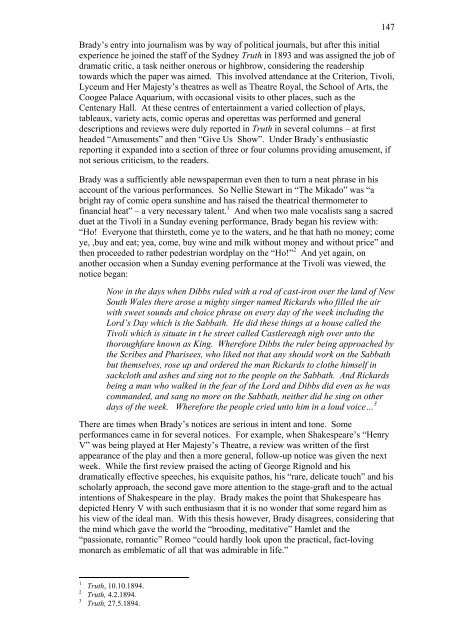A CRITICAL BIOGRAPHY OF EDWIN JAMES BRADY - Mallacoota ...
A CRITICAL BIOGRAPHY OF EDWIN JAMES BRADY - Mallacoota ...
A CRITICAL BIOGRAPHY OF EDWIN JAMES BRADY - Mallacoota ...
You also want an ePaper? Increase the reach of your titles
YUMPU automatically turns print PDFs into web optimized ePapers that Google loves.
147<br />
Brady’s entry into journalism was by way of political journals, but after this initial<br />
experience he joined the staff of the Sydney Truth in 1893 and was assigned the job of<br />
dramatic critic, a task neither onerous or highbrow, considering the readership<br />
towards which the paper was aimed. This involved attendance at the Criterion, Tivoli,<br />
Lyceum and Her Majesty’s theatres as well as Theatre Royal, the School of Arts, the<br />
Coogee Palace Aquarium, with occasional visits to other places, such as the<br />
Centenary Hall. At these centres of entertainment a varied collection of plays,<br />
tableaux, variety acts, comic operas and operettas was performed and general<br />
descriptions and reviews were duly reported in Truth in several columns – at first<br />
headed “Amusements” and then “Give Us Show”. Under Brady’s enthusiastic<br />
reporting it expanded into a section of three or four columns providing amusement, if<br />
not serious criticism, to the readers.<br />
Brady was a sufficiently able newspaperman even then to turn a neat phrase in his<br />
account of the various performances. So Nellie Stewart in “The Mikado” was “a<br />
bright ray of comic opera sunshine and has raised the theatrical thermometer to<br />
financial heat” – a very necessary talent. 1 And when two male vocalists sang a sacred<br />
duet at the Tivoli in a Sunday evening performance, Brady began his review with:<br />
“Ho! Everyone that thirsteth, come ye to the waters, and he that hath no money; come<br />
ye, ,buy and eat; yea, come, buy wine and milk without money and without price” and<br />
then proceeded to rather pedestrian wordplay on the “Ho!” 2 And yet again, on<br />
another occasion when a Sunday evening performance at the Tivoli was viewed, the<br />
notice began:<br />
Now in the days when Dibbs ruled with a rod of cast-iron over the land of New<br />
South Wales there arose a mighty singer named Rickards who filled the air<br />
with sweet sounds and choice phrase on every day of the week including the<br />
Lord’s Day which is the Sabbath. He did these things at a house called the<br />
Tivoli which is situate in t he street called Castlereagh nigh over unto the<br />
thoroughfare known as King. Wherefore Dibbs the ruler being approached by<br />
the Scribes and Pharisees, who liked not that any should work on the Sabbath<br />
but themselves, rose up and ordered the man Rickards to clothe himself in<br />
sackcloth and ashes and sing not to the people on the Sabbath. And Rickards<br />
being a man who walked in the fear of the Lord and Dibbs did even as he was<br />
commanded, and sang no more on the Sabbath, neither did he sing on other<br />
days of the week. Wherefore the people cried unto him in a loud voice… 3<br />
There are times when Brady’s notices are serious in intent and tone. Some<br />
performances came in for several notices. For example, when Shakespeare’s “Henry<br />
V” was being played at Her Majesty’s Theatre, a review was written of the first<br />
appearance of the play and then a more general, follow-up notice was given the next<br />
week. While the first review praised the acting of George Rignold and his<br />
dramatically effective speeches, his exquisite pathos, his “rare, delicate touch” and his<br />
scholarly approach, the second gave more attention to the stage-graft and to the actual<br />
intentions of Shakespeare in the play. Brady makes the point that Shakespeare has<br />
depicted Henry V with such enthusiasm that it is no wonder that some regard him as<br />
his view of the ideal man. With this thesis however, Brady disagrees, considering that<br />
the mind which gave the world the “brooding, meditative” Hamlet and the<br />
“passionate, romantic” Romeo “could hardly look upon the practical, fact-loving<br />
monarch as emblematic of all that was admirable in life.”<br />
1 Truth, 10.10.1894.<br />
2 Truth, 4.2.1894.<br />
3 Truth, 27.5.1894.


